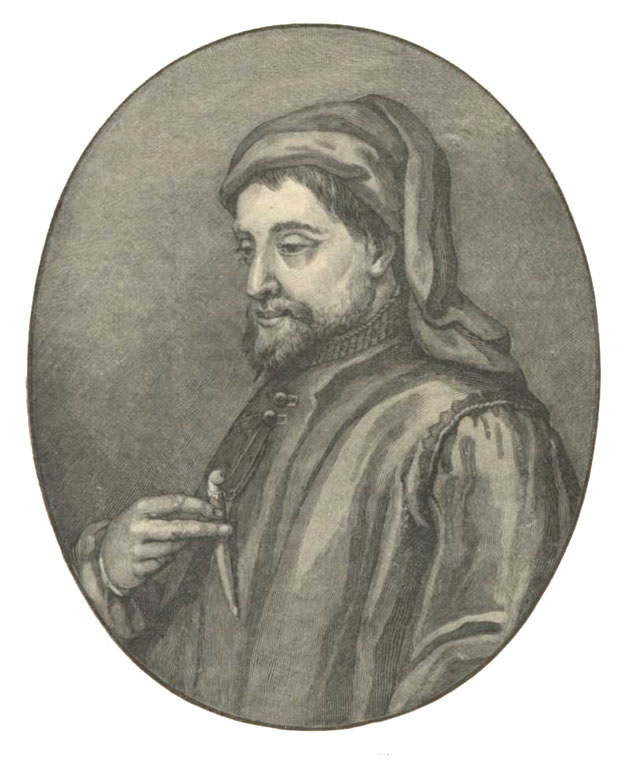Geoffrey Chaucer
(1342 - 1400)

Chaucer gives English poetry a first shape by the help
of French romance models and the work of Italian masters.
SRI AUROBINDO
from The Clerk’s Portrait [II.285-308]
A clerk ther was of Oxenford also,
That unto logyk hadde longe ygo.
As leene was his hors as is a rake,
And he nas nat right fat, I undertake,
But looked holwe, and therto sobrely.
Ful thredbare was his overeste courtepy;
For he hadde geten hym yet no benefice,
Ne was so wordly for to have office.
For hym was levere have at his beddes heed
Twenty bookes, clad in blak or reed,
Of Aristotle and his philosophie,
Than robes riche, or fithele, or gay sautrie.
But al be that he was a philosophre,
Yet hadde he but litel gold in cofre;
But al that he nyghte of his freendes hente,
On bookes and on lernynge he it spente,
And bisily gan for the soules preye
Of hem that yaf hym wherwith to scoleye.
Of studie took he moost cure and moost heede,
Noght o word spak he moore than was neede,
And that was seyd in forme and reverence,
And short and quyk and ful of hy sentence;
Sownynge in moral vertu was his speeche,
And gladly wolde he lerne and gladly teche.
Sri Aurobindo’s remarks:
«Chaucer has his eye fixed on the object, and that object is the external action of life as it passes before him throwing its figures on his mind and stirring it to a kindly satisfaction in the movement and its interest, to a blithe sense of humour or a light and easy pathos. He does not seek to add anything to it or to see anything below it or behind its outsides, nor does he look at all into the souls or deeply into the minds of the men and women whose appearance, action and easily apparent traits of character he describes with so apt and observant a fidelity. He does not ask himself what is the meaning of all this movement of life or the power in it or draw any large poetic ideas from it; he is not moved to interpret life, a clear and happy presentation in his business. […] And the form he gives it is within its limits and for its works admirably apt, sufficient and satisfying, — provided we ask from it nothing more than it has to offer us. Chaucer had learnt ease, grace and lucidity from the French romance poetry and from the great Italians a sufficient force and compactness of expression which French verse had not yet attained. But neither his poetic speech nor his rhythm has anything of the plastic greatness and high beauty of the Italians. It is an easy, limpid and flowing movement, a stream rather than a well, — for it has no depths in it, — of pure English utterance fitted for the clear and pleasing poetic presentation of external life as if in an unsullied mirror, at times rising into an apt and pointed expression, but for the most part satisfied with a first primitive power of poetic speech, a subdued and well-tempered even adequacy. Only once or twice does he by accident strike out a really memorable line of poetry; yet Dante and Petrarch were among his masters.»
«We take Chaucer with his easy adequate limpidity, —
He was a verray parfit gentil knight»
